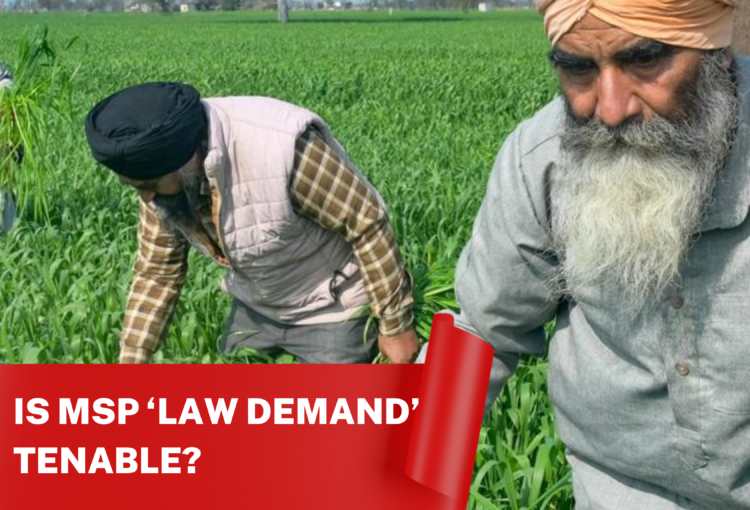Advocating for Farmer Rights: Sarwan Singh Pandher’s Push for MSP Legislation

In a notable development evoking widespread attention, Sarwan Singh Pandher, a prominent farmer leader, has called upon the Central government to convene a one-day Parliament session dedicated to addressing and ensuring a Minimum Support Price (MSP) guarantee. This proposition underscores a pivotal moment in the ongoing discourse surrounding agricultural reforms and the prevailing discontent amongst the farming community in India.
The Essence of the MSP Discourse
Introduced in the 1960s, the Minimum Support Price (MSP) system was designed to protect farmers by establishing a minimum price for their crops, with the government committed to buying surplus produce. However, despite its noble objectives, the system has encountered numerous inefficiencies. It frequently fails to cover a wide variety of crops and often does not benefit the majority of farmers across different states. As a result, when market prices fall below the MSP, it poses a serious threat to the livelihoods of countless farmers.
The Core of Farmer’s Demands
In response to these challenges, there is a growing demand for a legally enforceable Minimum Support Price (MSP) that would safeguard the interests of farmers by ensuring fair prices for a broader range of crops. This demand has been fueled by Prime Minister Narendra Modi’s pre-election pledges to reform the MSP calculation method, which, a decade later, remain unfulfilled.
In this context, farmer leaders such as Sarwan Singh Pandher have strongly reiterated their calls for legislative measures to guarantee MSPs for all 23 crops. They also advocate for comprehensive reforms addressing farmer welfare issues, including debt forgiveness, no hikes in electricity tariffs, and justice for victims of previous protests.
 Government’s Proposition and Subsequent Rejection
Government’s Proposition and Subsequent Rejection
In a bid to pacify the escalating tensions, the Central government introduced a proposal to procure certain crops at Minimum Support Price (MSP) levels through cooperative agencies, with the plan slated to span a five-year period. Despite this effort, the proposal was met with unanimous rejection from the protesting farmer representatives. They contend that the proposal fails to adequately address the comprehensive needs and concerns of the farming community as a whole.
Escalation and Response
Spurred by the impasse, farmer unions are poised to resume their ‘Dilli Chalo’ (March to Delhi) agitation, signaling a resolute stance against the government’s current proposals. This rekindled movement has also prompted administrative actions, including the extension of internet suspension in select areas of Punjab, underscoring the tense atmosphere enveloping this matter.
The Path Ahead
As the impasse between farmers and the government persists, the call for a one-day Parliament session represents not merely a procedural appeal but a crucial juncture reflecting the broader aspirations and grievances of the farming community. This scenario encapsulates a complex tapestry of policy, promises, and protests, underlying the significant socio-economic ramifications of the MSP debate on India’s agrarian landscape.
Conclusion
In conclusion, Farmer Leader Sarwan Singh Pandher’s advocacy for legislation on Minimum Support Price (MSP) guarantee marks a significant milestone in the ongoing discourse surrounding agricultural reforms in India. His call for a dedicated one-day Parliament session to address this critical issue underscores the urgent need for concrete action to safeguard the interests of farmers nationwide.
The essence of the MSP discourse reveals the longstanding challenges faced by farmers, with the current system often falling short of providing adequate protection and support. Farmer demands for a legally binding MSP on all 23 crops reflect their aspirations for fair and remunerative prices, essential for sustaining their livelihoods.
Ultimately, the MSP debate encapsulates not only the complexities of agricultural policy but also the broader socio-economic implications for India’s agrarian landscape. It is imperative for stakeholders to engage in constructive dialogue and take decisive action to ensure a sustainable and equitable future for farmers across the country.
Do you want to publish your own book?
We will help you get the best options for book publishing related services in India that helps you to self publish your book professionally. Complete set of publishing services. From designing book covers to publishing, promotion to distribution we provide them all. Click here to get free call back from our team consulting you regarding the publishing costs and the process.
Read Some of Our Other Blogs:
How to Protect Your Juvenile Rights in India
Marital Rape – An Unrecognized Crime in India
Unveiling the ambiguity regarding bar on ‘Anticipatory Bail’ under SC/ST (POA) Act, 1989
Development in interpretation of ‘sedition’ law in India

